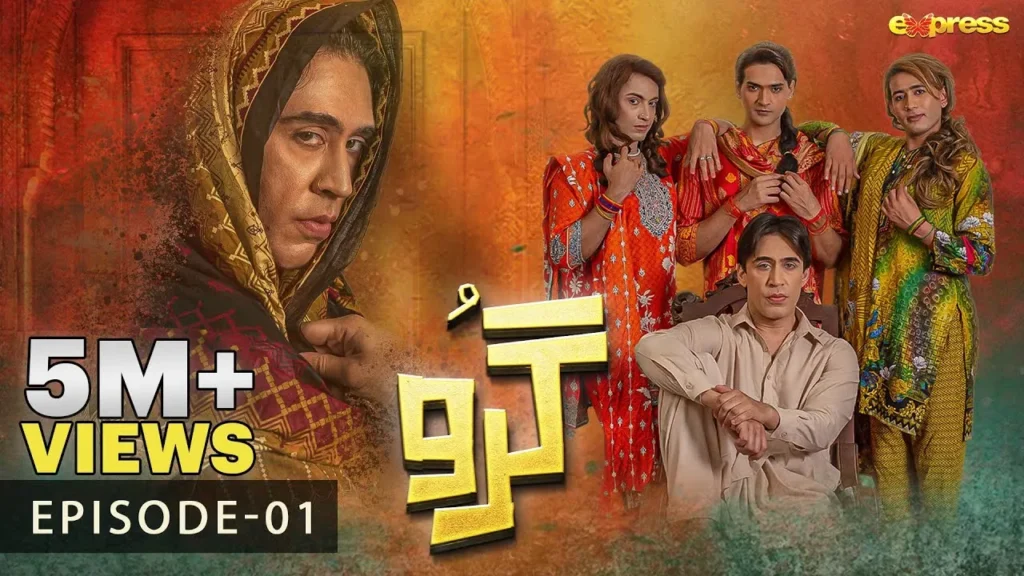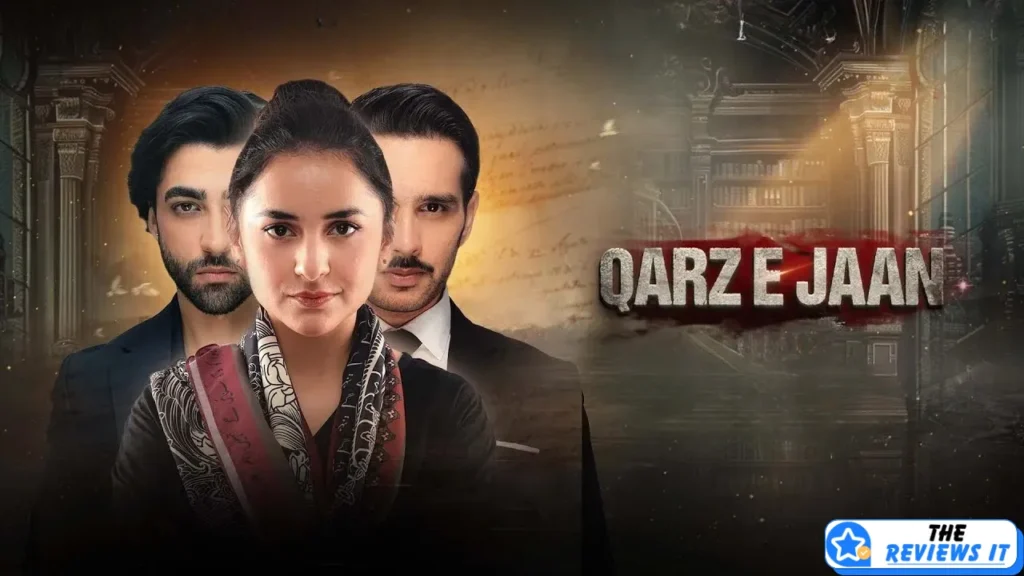Guru Drama Review: Guru is a compelling drama that explores the life and struggles of a transgender individual in a society rife with prejudice and stigma. Centered around Sattar, also known as Guru, the show delves into the complexities of identity, acceptance, and societal challenges faced by the transgender community. With its brave storytelling and heartfelt performances, Guru brings to light the often-overlooked issues of marginalized individuals, offering both a poignant narrative and a call for greater empathy and understanding.

Plot Summary
In Guru, the drama delves into a bold narrative that sheds light on the often-ignored social stigma surrounding the transgender community. The storyline revolves around Guru, a transgender individual who navigates the struggles of living in a society that marginalizes and discriminates against people like him. The drama explores themes of identity, acceptance, and the harsh realities faced by the transgender community in their quest for dignity and respect.
The central conflict arises from Guru’s determination to break free from societal stereotypes and prejudices while balancing relationships and personal challenges. Through its storytelling, Guru not only highlights the harsh treatment of marginalized individuals but also emphasizes the importance of understanding, empathy, and human rights.
Complete Details About Guru Drama
| Day | Wednesday |
|---|---|
| Genres | Drama |
| Timing | 8 PM |
| Directors | Bilawal Hussain Abbasi |
| Producers | Shazia Wajahat & Wajahat Rauf |
| Writers | Likhari |
| Channel Name | Express TV Entertainment |
| Country of Origin | Pakistan |
Character Analysis
In Guru, the main characters play a crucial role in bringing the powerful narrative to life, with each contributing to the drama’s emotional depth and social commentary.
Ali Rehman Khan as Sattar (Guru): The standout performance undoubtedly comes from Ali Rehman Khan, who portrays the titular character, Sattar, also known as Guru. His portrayal is nuanced, capturing both the strength and vulnerability of a transgender individual fighting for acceptance in a judgmental society. Ali Rehman Khan brings empathy and complexity to the role, making Sattar’s journey of self-discovery, resilience, and determination deeply relatable. His performance is both bold and sensitive, breaking stereotypes while offering a genuine representation of the challenges faced by the transgender community.
Hira Khan as Mariam: Hira Khan plays Mariam, a significant character who crosses paths with Guru. Mariam’s journey is one of understanding and growth as she navigates her own personal struggles while trying to empathize with the marginalized community. Hira Khan delivers a heartfelt performance, portraying her character’s emotional evolution with sincerity. Her interactions with Guru offer a fresh perspective on acceptance and compassion.
Zhalay Sarhadi as Fakhraa: Zhalay Sarhadi shines as Fakhraa, a character driven by strong emotions and protective instincts. Her performance brings intensity to the screen, especially in moments where she confronts societal norms and expectations. Fakhraa’s character is a pillar of strength, and Zhalay’s ability to balance tenderness with authority makes her portrayal memorable.
Ahmer Hussain as Suraiyya: Ahmer Hussain takes on the role of Suraiyya, a key character whose connection to Guru adds layers to the story. Suraiyya’s character provides insight into the emotional and familial ties that shape the narrative. Ahmer’s performance is subtle yet impactful, making Suraiyya’s challenges feel authentic and grounded.

Cast and Characters
| Actor Names | Characters |
|---|---|
| Ahmer Hussain | Suraiyya |
| Irfan Motiwala | Zamaan |
| Hira Khan | Mariam |
| Zhalay Sarhadi | Fakhraa |
| Ali Rehman Khan | Sattar |
| Shehryar Zaidi | Master Majeed |
| Kauser Siddiqui | Rubina |
| Humaira Asghar | Mona |
| Fozia Mushtaq | |
| Iqbal Umer |
Themes and Messages
Guru tackles several core themes, with the most prominent being the struggles and social stigmas faced by the transgender community. The drama uses its platform to shed light on the deep-rooted prejudice and marginalization that this community experiences, especially within a traditional and conservative society like Pakistan’s.
Key Themes:
- Identity and Acceptance: One of the main themes revolves around the quest for identity and acceptance. Through Sattar (Guru), the drama emphasizes the challenges transgender individuals face in defining their identity in a society that refuses to acknowledge them as equals. It delves into how societal rejection affects their mental and emotional well-being and portrays the strength required to live authentically.
- Breaking Social Barriers: Guru challenges conventional norms by addressing the cultural taboos associated with the transgender community. It portrays the harsh reality of being ostracized, ridiculed, and denied basic human rights simply for being different. By presenting these struggles on screen, the drama encourages viewers to question the ingrained biases and discriminatory behaviors that exist within society.
- Empathy and Human Rights: A major message in Guru is the call for empathy, understanding, and respect for human rights. It urges society to move beyond labels and treat people with dignity, regardless of their gender identity. This is a powerful commentary on how lack of compassion leads to the marginalization of entire communities and how small acts of kindness can make a significant difference in their lives.
- Family and Relationships: The drama also touches on the strained familial and social relationships that transgender individuals often face. It highlights how rejection by family members or loved ones can be as damaging as societal exclusion. However, it also presents characters who grow to understand and accept, providing a hopeful message that change is possible through awareness and education.
Effectiveness in Conveying Its Message:
Guru effectively conveys its message by centering its narrative around a strong, complex protagonist like Sattar. Through his story, the drama not only humanizes the transgender experience but also highlights the injustices they endure. In the Pakistani context, where discussions about gender identity are often silenced, Guru stands as a bold and necessary conversation starter.
The drama challenges the audience to rethink their views and question societal norms. It breaks down stereotypes and gives a voice to a community that has long been overlooked. By addressing these issues head-on, Guru brings much-needed attention to the struggles of marginalized communities in Pakistan, making it a socially relevant and impactful piece of storytelling.
Pacing and Plot Progression
The pacing of Guru is one of its strong points, managing to strike a balance between emotional depth and plot progression. From the very beginning, the drama captivates the audience with its bold storyline and unique approach to highlighting the struggles of the transgender community. The initial episodes establish the main conflict early on, introducing the central character, Sattar (Guru), and his world, which immediately engages the audience.
Smooth Plot Progression: The drama unfolds at a steady pace, ensuring that each episode builds on the last without dragging. The writers have skillfully woven in key plot points at regular intervals to maintain the narrative flow, allowing viewers to remain invested in the characters’ journeys. Major events in Guru’s life, such as moments of societal rejection, personal triumphs, and confrontations with family, are well-paced, giving the audience time to process and connect emotionally with the story.
Development of Key Plot Points: As the drama progresses, it does an excellent job of developing the central themes and exploring the personal growth of Guru and those around him. The show gradually deepens the relationships between the characters, especially highlighting the evolving dynamic between Guru and other significant characters like Mariam, Fakhraa, and Suraiyya. Each of these interactions adds a layer of complexity to the plot, keeping viewers engaged and emotionally connected to the story.
Unexpected Twists: One of the factors that help keep the audience hooked is the inclusion of unexpected twists. The drama throws in moments that challenge Guru’s resolve, push his boundaries, and test the empathy of those around him. These twists are not overly dramatic but feel organic, contributing to the overall narrative rather than feeling forced. They keep viewers guessing, adding an element of unpredictability to the story that heightens engagement.
Moments of Slowdown: While Guru is generally well-paced, there are a few moments where the drama slows down, particularly when exploring side plots or providing deeper insights into supporting characters. These slower moments serve to flesh out the world around Guru, but they can sometimes feel like a distraction from the main storyline. However, they do help in adding more depth to the overall narrative, giving viewers a fuller understanding of the societal challenges at play.

Strengths and Weaknesses
Guru is a drama that stands out for its bold exploration of social issues, but like any show, it has its strengths and weaknesses.
Strengths:
- Compelling Storyline: Guru excels in its storytelling, offering a fresh and important perspective on the transgender experience. The narrative is engaging from start to finish, tackling social stigmas with sensitivity and depth. The drama’s focus on identity, acceptance, and societal prejudice provides a strong foundation for a compelling story.
- Powerful Performances: The cast delivers standout performances, particularly Ali Rehman Khan as Sattar (Guru). His portrayal of the titular character is both poignant and powerful, capturing the emotional and psychological challenges faced by transgender individuals. Supporting actors like Hira Khan, Zhalay Sarhadi, and Ahmer Hussain also contribute significantly to the drama’s impact with their well-rounded performances.
- Character Development: The character development in Guru is notable. Sattar’s journey is portrayed with depth and nuance, making his struggles and triumphs feel authentic. The relationships between characters evolve in meaningful ways, adding layers to the story and enhancing the overall narrative.
- Social Commentary: The drama’s ability to address and challenge societal norms is a significant strength. By highlighting the issues faced by the transgender community, Guru opens up important conversations about empathy, acceptance, and human rights. This social commentary is both timely and relevant, particularly within the context of Pakistani society.
Weaknesses:
- Pacing Issues: While the drama generally maintains a good pace, there are moments where the story slows down. Some episodes focus on subplots or side characters that, while adding depth, can detract from the main narrative. These slower moments may disrupt the flow for viewers who are eager to see more of the central story.
- Unnecessary Subplots: Certain subplots feel less integrated into the main storyline and can sometimes feel like filler. These tangents, while occasionally offering additional character insights, do not always advance the primary plot or themes effectively. This can lead to a sense of unevenness in the narrative.
- Occasional Over-Emphasis on Melodrama: At times, Guru leans into melodrama, which can overshadow the subtlety of its more impactful moments. While emotional intensity is important, there are instances where the drama’s portrayal of conflict or emotional scenes feels exaggerated, potentially detracting from the authenticity of the story.
- Weaker Performances: While the lead performances are strong, some supporting roles may not be as impactful. There are moments where certain characters’ performances do not fully capture the complexity of their roles, which can affect the overall coherence of the narrative.
Audience Reception
The reception to Guru has been largely positive, with many viewers and critics praising its bold approach to addressing social issues. Fans have lauded the drama for its courageous portrayal of the transgender experience and the strong performances, particularly from Ali Rehman Khan. Many viewers appreciate how Guru brings important conversations about identity and acceptance into the spotlight, highlighting a community that is often marginalized.
Critics have similarly praised the drama’s narrative and its ability to engage with relevant social topics. The drama’s portrayal of societal stigma and the personal struggles of its protagonist has resonated with a broad audience, leading to meaningful discussions on social media about the challenges faced by transgender individuals.
However, Guru has also sparked some controversy. Certain viewers have debated the accuracy and sensitivity of its portrayal of transgender issues, with some feeling that certain aspects of the drama could reinforce stereotypes rather than dismantle them. Additionally, the melodramatic elements and pacing issues have been points of contention, with some critics arguing that they detract from the drama’s impact.

Final Verdict
Overall, Guru is worth watching, especially for those interested in socially conscious dramas that tackle significant and often underrepresented issues. The drama’s strong performances and its courageous exploration of transgender issues make it a standout piece in terms of both storytelling and social relevance. It’s a must-watch for viewers who are looking for content that challenges societal norms and offers a nuanced perspective on human rights and acceptance.
However, those who prefer a more conventional or lighter drama might find Guru to be a bit intense or emotionally charged. It is particularly valuable for audiences who are open to engaging with thought-provoking material and are interested in stories that push the boundaries of traditional storytelling.
Personal Opinions
Watching Guru was a deeply moving experience. The drama’s commitment to addressing a critical social issue through the lens of a well-developed protagonist made it both impactful and thought-provoking. Ali Rehman Khan’s performance as Guru was exceptional, bringing a rare depth and authenticity to the role that made Sattar’s journey resonate on a personal level.
The drama’s exploration of identity and acceptance felt both necessary and relevant, especially in a cultural context where these conversations are often avoided. While some moments of melodrama and pacing issues slightly detracted from the overall experience, the drama’s core message and emotional weight were compelling and successfully conveyed.
Conclusion: Wrapping Up the Guru Drama Review
In conclusion, Guru is a significant and impactful drama that tackles important social issues with bravery and sensitivity. Its strong performances and bold storytelling make it a standout piece in the realm of socially conscious television. Despite some minor flaws, such as pacing and melodramatic elements, the drama effectively delivers its message and offers a valuable perspective on the struggles faced by marginalized communities.
For those interested in exploring meaningful and socially relevant content, Guru is a highly recommended watch. It provides not only entertainment but also an opportunity for reflection and discussion on important issues of identity and acceptance.









